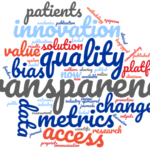
Reproducibility challenges are an impediment to scientific progress. In this article, Dr Becky Upton (President of the Pistoia Alliance) examines ways in which reproducibility in life sciences R&D can be addressed and discusses some of the collaborative initiatives that the Pistoia Alliance is championing to help address this common issue.
Reproducibility is an important issue in life sciences. Inability to reproduce research findings negatively affects their credibility, wastes resource, and can delay important scientific and medical advancements. Yet variations in experimental materials and conditions and in data analysis approaches and algorithms combine to make reproducibility in biomedical research hard to achieve. Incomplete reporting of experimental methods also contributes to the challenge.
Some critical ways in which reproducibility can be improved include:
- protocol development and publication: developing detailed protocols that clearly outline all steps, settings and materials to be used, and publishing protocols (or protocol details) in relevant forums, such as in appropriate registries and dedicated sections of research publications and/or in supplementary materials
- method standardization initiatives: developing sector-wide standards for experimental methods and promoting their adoption; for instance, journals and professional societies can promote standardized guidelines for conducting experiments and reporting research methods
- encouraging replication studies: funding and publishing studies specifically aimed to test the reproducibility of methodological approaches; replication research can help to validate the robustness of methods and highlight potential issues but is often overshadowed within current evidence generation and publishing models by research with greater perceived novelty
- training and education: investing in education and training for researchers in methodological rigour and standardization.
Pistoia Alliance efforts
The Pistoia Alliance is a global not-for-profit alliance that advocates for greater collaboration in life sciences and healthcare R&D to overcome common challenges shared by the sector. Together with our global members (who work across the pharmaceutical R&D value chain), the Pistoia Alliance has established several key initiatives to support improved research replicability.
HELM project
Hierarchical Editing Language for Macromolecules (HELM) is a notation system developed to describe complex biomolecules – such as peptides, nucleotides and antibodies – that are often used in pharmaceutical R&D.
Scientists can use HELM to share information about molecular structures across various software platforms and organizations in a way that is easily understood. The interoperability offered by HELM is essential for collaborative research efforts and for maintaining the integrity of data as it is transferred between different systems.
Through the HELM project, the Pistoia Alliance and our members have played a significant role in promoting the use of HELM to enhance method replicability, particularly in the area of biomolecular research.
Semantic Enrichment of ELNs
Our Semantic Enrichment of Electronic Lab Notebook (ELN) Data project aims to enhance the value of data recorded in ELNs by making it more accessible, interpretable and reusable.
Semantic enrichment of ELNs involves tagging relevant data with metadata and using standardized vocabularies (ontologies) to define the relationships between different data elements. The process of semantic enrichment makes the data more searchable and interoperable across different systems and disciplines.
Enhanced ELN data interoperability supports collaboration between different research teams and institutions. It allows researchers to share data more easily and enables collaborative working on joint projects, even when researchers use different systems and terminologies in their individual work.
DataFAIRy Bioassay Annotation project
The Pistoia DataFAIRy Bioassay Annotation project focuses specifically on the application of the FAIR (i.e. findable, accessible, interoperable, reusable) data principles to bioassay data.
This initiative is crucial for enhancing the utility, sharing and standardization of bioassay data in the life sciences industry. It ensures bioassay data are consistently formatted and described across different studies, and within different databases. Data standardization is achieved through the development of common data models, terminologies and ontologies that are specific to bioassays and by ensuring detailed documentation of experimental conditions, methodologies and results so that data can be effectively used for future studies and/or by other researchers.
The Pistoia Alliance’s portfolio of projects and communities is proposed by its members; the projects seek to address the most pressing challenges in our industry. If you have an idea on how to improve life sciences and healthcare R&D and would like to get involved in the Pistoia Alliance, you can learn more here.
Dr Becky Upton is President of the Pistoia Alliance.
Enjoy reading our content? Read last week’s digest here and check out our previous guest blog!
Don’t forget to follow us on Twitter/X and LinkedIn for regular updates!






